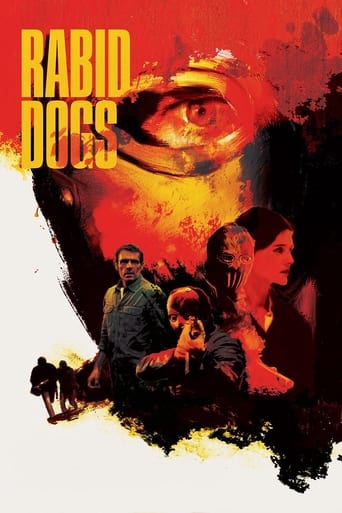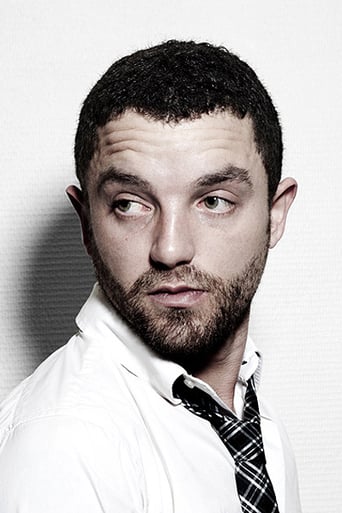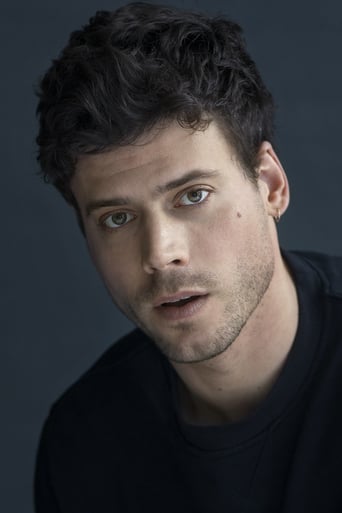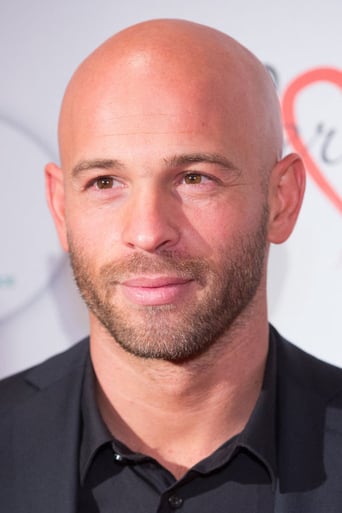Stometer
Save your money for something good and enjoyable
Stevecorp
Don't listen to the negative reviews
Majorthebys
Charming and brutal
SanEat
A film with more than the usual spoiler issues. Talking about it in any detail feels akin to handing you a gift-wrapped present and saying, "I hope you like it -- It's a thriller about a diabolical secret experiment."
lonchaney20
I was pretty surprised to learn that a remake of Mario Bava's Rabid Dogs (1974) had been filmed under everyone's noses, and once it popped up on Netflix streaming I had to check it out. The original Rabid Dogs is one of Bava's most atypical and yet most effective thrillers, in which the director very consciously sought to reinvent himself. Bava was (and still is) most renowned for his Gothic horror films, but his Romantic and stylized approach to the genre seemed hopelessly dated to seventies film-goers, and so he set about producing an extremely gritty and contemporary crime thriller. Unfortunately the film wasn't released in Bava's lifetime due to an untimely bankruptcy on the producer's part, and post-production wasn't completed until the mid-nineties. With all of this in mind, it strikes me as particularly interesting that this is the first Bava film to receive an official remake, and even more so to see how radically different Hannezo's approach is from Bava's.The story concerns three criminals on the run after a violent robbery, and the game of cat and mouse that plays out between them and their three hostages: a woman, a man, and the man's young daughter. As the film begins, a character who we will soon identify as the male hostage tells himself in voice-over, "Ignore the assholes who preach. This is your story. Only your version matters. No other." Here Hannezo seems to be telling the viewer to forget Bava's version, and that this new film should be judged on its own merits, but the words strike me as insincere since the film itself is credited as an adaptation of Bava's film rather than the short story, "Man and Boy," and even uses a techno cover of Stelvio Cipriani's original theme music. Nonetheless, Hannezo does distinguish himself from Bava in a number of ways.Whereas Bava tells his frantic story in a linear fashion, and essentially in real time, Hannezo attempts to flesh out the film and its characters with several stylized flashbacks. Thus we see how such-and-such criminal began their life of crime, what our hostages were up to before their capture, etc. While the scenes are beautifully lensed in vivid Refn-esque primary colors by D.P. Kamal Derkaoui, they don't contribute anything of importance to the narrative. The insights they provide into the characters are superficial at best, and don't significantly inform their decisions throughout the story. More surprising, though, is how much tamer Hannezo's version is in terms of its on screen violence. Though the gunshots are more graphic here than in the original, most likely due to Bava's meager budget ruling out elaborate make-up effects, it significantly dials down the torture and sexual violence that its heroine undergoes. This isn't necessarily a criticism (who leaves a movie complaining there wasn't enough rape, other than sadists and serial killers?), but it does mean that Bava's film is easily the more shocking and transgressive of the two. And since Hannezo films his story in a far more glossy, stylized way than Bava, the violence isn't nearly as hard-hitting when it does occur, though he certainly knows how to craft an exciting chase scene.The biggest issue with the remake, I think, is in the casting, since the players here are largely interchangeable, with the only standouts being Lambert Wilson as the man, and François Arnaud as the most sadistic of the three criminals. Arnaud isn't given as much to do as his counterpart in the original, but he has a young Oliver Reed vibe to him, which made him stand out in a big way. Unfortunately the largely generic actors here make it far more difficult to care about the characters' fates.After the last scene played out in almost exactly the same fashion as in the original film, I found myself questioning why this one even needs to exist. Though it's very well produced and reasonably entertaining, it doesn't really accomplish anything of note that the original film didn't do better. By providing a new point of comparison with Bava's original film (another point being the misguided Kidnapped cut assembled by Alfredo Leone and Lamberto Bava), though, this remake sheds greater light on why Bava's interpretation of the story remains so effective, so for that I appreciate the experience. If you haven't seen either version, though, I'd definitely stick with Bava's, which remains a classic of its genre.
Peter Lorme
Rabid Dogs, or Enragés, (2016) is a presentable but utterly inferior remake. While this remake, like most, turned out to be pretty pointless- there were still new elements brought to the table. The basic story, when stripped down to its very core, is the same as the original. They add a few different twists and turns throughout the ride. Still, the original remains superior: so simpler yet so much better. All of the newly added plot points really do nothing that would raise this film to be anything other than mediocre. At least the action is better in this one, but that doesn't effect the overall impact of the story. I'll give credit where credit is due: this film is not nearly as cheesy as the original. Nothing was laughably over-the-top. If I were to forget the original and call this an "original film", I would say that it's just another mediocre kidnap-based movie. It may not be as useless as other remakes, but it definitely does not elevate the source material.
Coventry
Like most horror/cult cinema fanatics, I don't like remakes. So when I heard there was going to be remake of one of the greatest movies of my all-time favorite director, I knew from beforehand that I would be even more skeptical than usually the case with remakes. "Cani Arrabbiati", a.k.a "Rabid Dogs" or "Kidnapped", was an ambitious Poliziotteschi/Euro-Crime project by the almighty Italian director Mario Bava (the most genius director who ever lived) and his son Lamberto in 1974, but due to legal issues and production company bankruptcies, the film sadly only got finished in 1997 long after Mario's death and the career peaks of Lamberto. Still, in spite of the juridical issues, it was one of the absolute highlights in its kind. I watched the remake (original French title: "Enragés") at the Brussels International Film Festival and I must say I was pleasantly surprised. Although by no means an exceptional or astounding film, but nevertheless a solid and compelling thriller with a tense atmosphere from start to finish as well as intriguing characters, gritty action sequences and an exhilarating soundtrack. Sabri is the getaway driver of a violent bank heist, but their scheme goes awry almost straight from the beginning. Sabri, along with his three companions, must dump the conspicuous getaway car and blend into the crowds of a shopping mall. But their leader is badly hurt and the blood trail that he leaves behind puts all the city's police forces back on their tail. While the number of casualties disturbingly mounts, the gangsters take an attractive woman hostage and run back out into the streets. They stop another vehicle, an inconspicuous old grey Volvo, which also give them two more hostages; a father who was on his way to the hospital with his unconscious 4-year-old daughter for a lifesaving kidney transplant. This is still only just the beginning of a very long, intense and nightmarish journey with numerous obstacles, deadly confrontations and unforeseen surprises. Although the trio of fugitive hoodlums succeeds fairly well in coming across as cruel and menacing (particularly Vincent played by François Arnaud) they honestly aren't even half as nihilistic, loathsome and vile as the thugs in Bava's original. Compared to Blade or Thirty-Two of the 1974 film, these guys are merely rabid puppies instead of dogs and thus also the overall tone of "Enragés" is less unsettling due to this. The violence is quite explicit but not too shocking, and only a couple of scenes are truly memorable, like the stop at the gas station or the showdown during the feast of the bear town-festival. The climax, however, is very well-handled and in case you're not familiar with the story you definitely will be dumbfounded, as there's no way anyone could predict this type of plot-twist. The acting performances are more than adequate, with respectable roles for Lambert Wilson and the still extremely attractive Virginie Ledoyen as the hostages, but my personal favorite aspect of "Enragés" was undoubtedly the soundtrack. The eerie and tense tunes are often reminiscent of a Goblin or giallo soundtrack, and near the end there's also a beautiful choir version of Radiohead legendary song "Creep" (which, I think, was also used in "The Social Network")
GUENOT PHILIPPE
You have to know that this movie is a sort of remake of Mario Bava's Carri Arrabiatti, shot in 1974, where Ricardo Cucciola had the same character played here by Lambert Wilson. He is a common driver and father of a little girl who is held as hostage by a group of brutal hoodlums. And a female innocent bystander is also involved in the scheme. Well, it is a B movie, a noir, brutal and typical of what the french movie industry may try from time to time since several years now. The peak of this film is the end, which is Alfred Hitchcock Presents's ending like. A really pure twist ending. It jumps in your face. Literally. Only the end is really worth. But maybe I am a little too hard with this film. For a first feature - I presume - it's a good try. And I was also glad to see Virginie Ledoyen, after such a long time.





